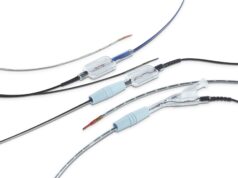
Philips Zenition, a new mobile C-arm imaging platform from Philips, has launched in the USA, Germany, Austria and Switzerland. It is being introduced into these countries over the next six months, and is set to penetrate other markets in the second half of 2019.
Mobile C-arms are X-rays systems that are brought into the operating room to provide live image guidance during a wide range of surgeries, including orthopaedic, trauma and vascular procedures. According to a company press release, the Zenition mobile C-arm platform brings together innovations in image capture, image processing, ease-of-use and versatility pioneered on Philips’ earlier Azurion platform.
The scope and complexity of surgical interventions—especially in the rapidly growing area of image-guided minimally invasive surgery—continues to increase, as does the number of patients requiring treatment. In order to treat more patients at a lower cost, Philips say in a company statement, hospitals require a versatile fleet of C-arms with varying capabilities that easily adapt to the needs of different types of surgery and different operators. Philips claim that Zenition mobile C-arms are easy to move between operating rooms, simple to position around the patient and intuitive to operate.
“The Philips Zenition is a user-friendly system that is intuitive to use for both surgeons and nursing staff,” says Nikolaos Bonaros, associate professor of Cardiac Surgery at the Medical University of Innsbruck, Austria. “Its simplified workflow means that we can convert a room from a conventional operating room to a high-quality interventional room more quickly. At the same time the system provides high image quality at the level required for hybrid operating room procedures.”
Philips Zenition has a tablet-like user interface and this, coupled with the “Unify” workflow, mean that once an operator has learned to use one system on the platform, it is easy for them to operate them all, a press release states. The company also claim that the compact design of the device, as well as its ability to capture images at the periphery of the image intensifier or flat detector, reduce the need for C-arm repositioning by 45%.
The Zenition C-arm systems incorporate the same image processing algorithms used on Philips’ Azurion platform. Additionally, the platform features Philips’ MetalSmart software, which automatically adjusts the contrast and brightness of images to aid image quality, purportedly useful when metal objects such as implants are present in the field of view.
Philips’ Zenition C-arms are CE marked and have received 510(k) clearance from the US Food and Drug Administration (FDA). They will be showcased at the 2019 European Congress of Radiology (ECR) Exhibition (28 February–3 March, 2019, Vienna, Austria).













